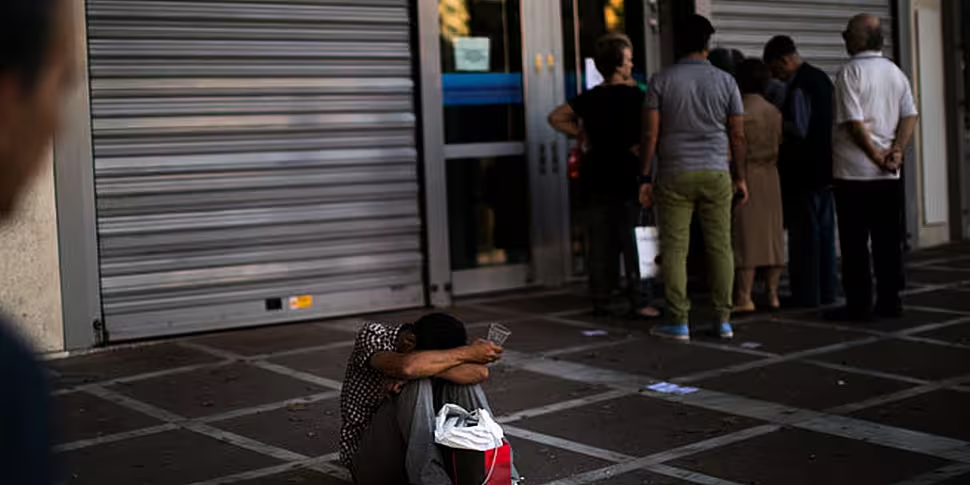The European Central Bank has decided to maintain its emergency cash lifeline for Greek banks while they remain closed until Thursday.
But the ECB has also made it slightly harder for the banks to qualify for the emergency loans, by requiring a higher standard of collateral.
It says the Greek government bonds, usually offered by banks in exchange for the emergency funding, are now less valuable because of the ongoing crisis.
Greece earlier announced to extend the bank holiday for a few more days despite promises that branches would reopen on Tuesday.
Yanis Varoufakis, who quit as finance minister on Monday, had said that banks would open tomorrow.
But the head of the Greek Bank Association has confirmed they will stay closed until at least Thursday, with a €60 daily limit on ATM withdrawals kept in place.
The Greek people rejected a tough new bailout deal on Sunday, with 61% snubbing demands for further austerity measures.
Creditors had wanted more spending cuts in exchange for extending the country's multibillion euro bailout deal until November.
Anti Austerity Alliance TD Paul Murphy is in Greece, and thinks the outcome sends a clear message to the Eurozone's leaders:
Germany and France are urging Greece to make detailed proposals when bailout talks are revived tomorrow.
German chancellor Angela Merkel has been holding talks with France's president this evening:
IMF 'has taken note' of result
The head of the International Monetary Fund (IMF), Christine Lagarde has responded to the referendum result, saying: "The IMF has taken note of yesterday’s referendum held in Greece."
"We are monitoring the situation closely and stand ready to assist Greece if requested to do so."
Greek Prime Minister Alexis Tsipras called the result a "victory of democracy" and said the Greek people had made a "very brave choice".
But Mr Varoufakis quit soon afterwards, saying he had been "made aware" some members of the Eurozone did not want him at the meetings of finance ministers.
He added: "I shall wear the creditors' loathing with pride."
Newly appointed Greek Finance Minister Euclid Tsakalotos will meet European finance ministers, including Michael Noonan, tomorrow. Sources say that the EU side remains sceptical that any real agreement can be made.
IMF chief Christine Lagarde says the IMF is ready to help Greece | Image: Niall Carson / PA Archive/Press Association Images
Mr Tsipras met on Monday with the leaders of six of the seven parties represented in Parliament at the presidential palace.
He then spoke to German Chancellor Angela Merkel and agreed to discuss new proposals on Tuesday. He also chatted on the phone with French President Francois Hollande and Russian President Vladimir Putin.
Mr Putin told him that he supports the Greek people in their efforts to "overcome difficulties".
Mr Tsipras has promised to return to the negotiating table to push for better terms from Greece's creditors - the European Union, IMF and European Central Bank (ECB).
The government says it believes a new bailout deal could be possible with the next 48 hours.
Mr Tsipras also stressed the referendum did not necessarily mean Athens would leave the euro - polls show most people in Greece want to stay in the currency union.
No country has ever left the 19-member Eurozone.
An emergency summit of leaders and finance ministers from all Eurozone countries will take place on Tuesday.
And the Taoiseach Enda Kenny says Greece will need to make the next move - if it wants any more help from Europe.
But European Commissioner for the Euro, Valdis Dombrovskis, says the referendum has made agreement more difficult.
Dan O’Brien, chief economist of Institute of International and European Affairs, spoke to The Right Hook about the current situation:










